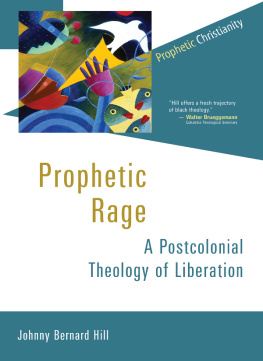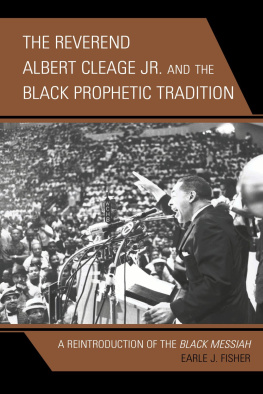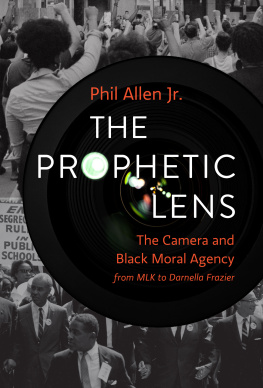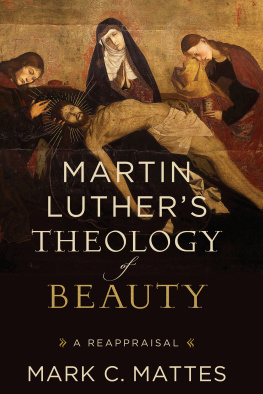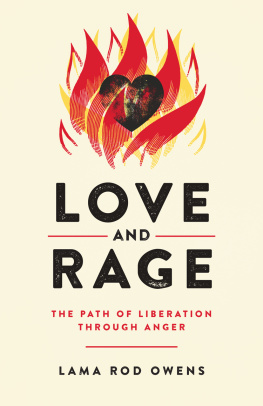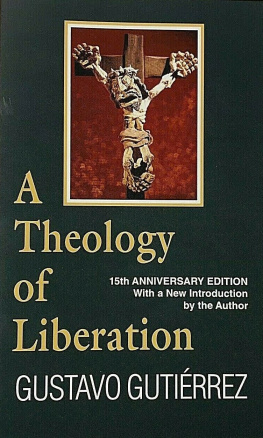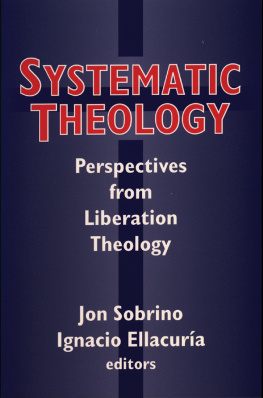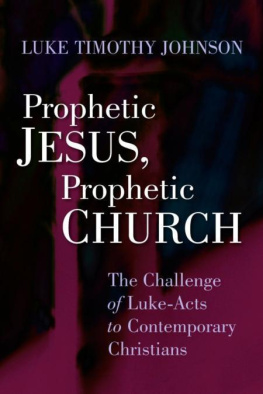
PROPHETIC CHRISTIANITY
Series Editors
Bruce Ellis Benson
Malinda Elizabeth Berry
Peter Goodwin Heltzel
The Prophetic Christianity series explores the complex relationship between Christian doctrine and contemporary life. Deeply rooted in the Christian tradition yet taking postmodern and postcolonial perspectives seriously, series authors navigate difference and dialogue constructively about divisive and urgent issues of the early twenty-first century. The books in the series are sensitive to historical contexts, marked by philosophical precision, and relevant to contemporary problems. Embracing shalom justice, series authors seek to bear witness to Gods gracious activity of building beloved community.
PUBLISHED
Bruce Ellis Benson, Malinda Elizabeth Berry, and Peter Goodwin Heltzel, eds., Prophetic Evangelicals: Envisioning a Just and Peaceable Kingdom (2012)
Peter Goodwin Heltzel, Resurrection City: A Theology of Improvisation (2012)
Johnny Bernard Hill, Prophetic Rage: A Postcolonial Theology of Liberation (2013)
Randy S. Woodley, Shalom and the Community of Creation: An Indigenous Vision (2012)
2013 Johnny Bernard Hill
All rights reserved
Published 2013 by
Wm. B. Eerdmans Publishing Co.
2140 Oak Industrial Drive N.E., Grand Rapids, Michigan 49505 /
P.O. Box 163, Cambridge CB3 9PU U.K.
Printed in the United States of America
19 18 17 16 15 14 13 7 6 5 4 3 2 1
Library of Congress Cataloging-in-Publication Data
Hill, Johnny Bernard.
Prophetic rage: a postcolonial theology of liberation / Johnny Bernard Hill.
pages cm. (Prophetic Christianity)
Includes bibliographical references and index.
ISBN 978-1-4674-3900-8 (pbk.: alk. paper)
1. Liberation theology. 2. Postcolonial theology. I. Title.
BT83.57.H55 2013
230.0464 dc23
2013022266
www.eerdmans.com
For the Voiceless
Contents
We can do absolutely nothing without the support of community. Those persons who have surrounded me (colleagues, friends, family, and students) have been and continue to be the wind in my sails. Without them, nothing would be possible. First and foremost, the editors of this series (Bruce Ellis Benson, Malinda Elizabeth Berry, and Peter Goodwin Heltzel) are to be celebrated and applauded for introducing such a series at this important moment in history. Their prophetic imagination and keen intellectual precision have made possible this present work; to them I am forever thankful. I would like to offer a special debt of gratitude to Paul Myhre and the Wabash Center for Religion and Theology for the very generous gift of the Research Fellowship, and to the staff of the Association of Theological Schools, Steven Graham and Dan Aleshire, for the support of the Theological Scholars Grant. Both grants helped to support the research of the project, and for that I am eternally grateful. The title for this book was inspired by a presentation delivered by Mark Taylor at the American Academy of Religion in 2008. I am very appreciative of his courageous and creative witness for justice and liberation.
This book is the product of many lectures, presentations, sermons, and exchanges that have taken place in recent years. I would like to thank students, friends, and colleagues at those communities, such as the University of Chicago, Garrett-Evangelical Theological Seminary, Johns Hopkins University, Bellarmine University, McAfee School of Theology at Mercer University, Pittsburgh Theological Seminary, Spalding University, Shiloh Baptist Church of Plainfield, New Jersey, and Morning Star Baptist Church of Queens, New York.
I would like to offer a special word of thanks and appreciation to the students, friends, and colleagues at the Interdenominational Theological Center in Atlanta, Georgia. Thank you for reminding me of the power of Sankofa and the ways in which Christianity at its best is prophetic. Colleagues such as Dr. C. T. Vivian, Stephen Ray, Karen Jackson-Weaver, Young Lee Hertig, Walter Silva Thompson, Gerald Lamont Thomas, Amy Plantinga Pauw, Ken Walden, Robin Dease, Monica Coleman, Peter Heltzel, Ronald Peters, and many others were incredibly helpful in their words of wisdom as well. I thank my students at Louisville Seminary, the Interdenominational Theological Center, and Claflin University for challenging me with their questions and reflections, and in particular, Adam Clark and Darvin Adams for assisting with the research for the book.
My children, Regan and Jonathan, are so wonderful and truly make life worth living. They are my inspiration, and to them I say thank you for their sacrifice and support of this work.
I hate, I despise your religious feasts;
I cannot stand your assemblies.
Even though you bring me burnt offerings and grain offerings,
I will not accept them.
Though you bring choice fellowship offerings,
I will have no regard for them.
Away with the noise of your songs!
I will not listen to the music of your harps.
But let justice roll on like a river,
righteousness like a never-failing stream!
(Amos 5:21-24 NIV)
Revolution is mankinds way of life today. This is the age of revolution;the age of indifference is gone forever. But the latter agepaved the way for today; for the great masses of mankind, whilestill suffering the greatest oppression and the greatest affronts totheir dignity as human beings, never ceased to resist, to fight aswell as they could, to live in combat. The combatant dignity ofhumanity was maintained in an unbreakable though not alwaysvisible line, in the depths of the life of the masses and in the uninterruptedfight slandered, attacked, but alive in the very centerof history of little revolutionary vanguards bound to this profoundhuman reality and to its socialist future, and not to the ap
Prophetic Rage is a manifesto of liberation, hope, and reconciliation . It is the cry of millions from around the world, both Christian and non-Christian, representing all races and ethnicities, genders, sexual orientations, and faiths, yearning to be free, to be whole, to flourish. Inspired by the long and creative legacy of prophetic Christianity, Prophetic Rage is the call for renewal and transformation in the quest to resist empire and establish alternative spheres of peace, justice , reconciliation, hope, and redemption in the world. It represents the challenge of establishing a political theology of difference , rooted in the prophetic call for justice and reconciliation in the church and society. By summoning and reclaiming the prophetic dimensions of black religion and black theology s challenge to white supremacy , Prophetic Rage offers a new vision for resisting and overcoming empire, and its related tentacles of racism , patriarchy , violence and militarism , and economic exploitation. Beverly W. Harrison observes in The Power of Anger in the Work of Love: Christian Ethics for Women and Other Strangers that womens bodies have taught us great lessons about the power of righteous anger, so prophetic rage is insightful as we think about forging a constructive postcolonial theology of liberation for our present age.
Prophetic rage courses through my veins. I am the great-great-grandson of the enslaved. I was raised in the gutbucket belly of the South, grandson of a sharecropper. My mother cleared bedpans and tended to the wounds of the sick and dying bodies of white racists. My father was a sanitation worker, not unlike those that Martin Luther King Jr. marched for and subsequently died for in Memphis, Tennessee, on April 4, 1968. In a real sense, Dr. King gave his life standing and fighting for my father, a hardworking, decent man, tall and strong. The rage that beats in my heart is a righteous rage, grounded in the love for humanity, yet yearning for redemption and hope. Because of what Dr. King represents, and sacrificed for men like my father, the sanitation worker, I have dedicated my life, heart, and soul to fight, resist, and struggle for the cause of freedom, justice, and equality. It is through this lens that I make the case that prophetic rage is a necessary prescriptive response to the present culture of imperialism and nihilism.
Next page
